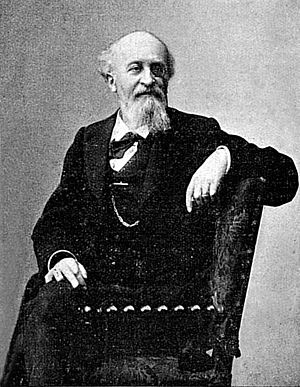Gaston Paris facts for kids
Quick facts for kids
Gaston Paris
|
|
|---|---|
 |
|
| Born | 9 August 1839 Avenay-Val-d'Or |
| Died | 5 March 1903 Cannes (France) |
| Occupation | Writer and scholar |
| Position held | seat 17 of the Académie française (–1896) |
Bruno Paulin Gaston Paris (born August 9, 1839 – died March 5, 1903) was a famous French writer and scholar. He focused on studying old French stories, poems, and languages. He was so good at his work that he was nominated for the Nobel Prize in Literature three times!
Contents
About Gaston Paris
Gaston Paris was born in a town called Avenay, in France. His father, Paulin Paris, was also a very important scholar who studied old French writings. Because of his father, Gaston grew up loving old French stories and poems.
To learn even more, Gaston studied at the University of Bonn in Germany. He also went to the École Nationale des Chartes in France. These studies helped him become an expert in old languages and literature.
His Teaching Career
Gaston Paris started by teaching French grammar at a private school. Later, in 1872, he took over from his father as a professor. He taught about medieval French literature at the Collège de France, a very famous school in Paris.
He became a member of important groups like the Académie des Inscriptions et Belles-Lettres in 1876. In 1896, he joined the Académie Française, which is one of France's highest honors for people who use the French language well. In 1895, he became the director of the Collège de France.
His Contributions to Literature
Gaston Paris became known across Europe as a top scholar of Romance studies. This field looks at languages and literature that came from Latin, like French, Spanish, and Italian. He learned how to do very careful research in Germany.
He was not only a careful language expert but also a smart literary critic. This means he was very good at understanding and judging literature. He used his clear thinking to study medieval French literature.
One of his most important works was Vie de saint Alexis (1872). This book was a new way to edit old texts. It included the original story and how it changed over hundreds of years. He also wrote a lot for the Histoire littéraire de la France, which is a big history of French literature. With Paul Meyer, he started a magazine called Romania. This magazine was all about studying Romance literature.
International Recognition
In 1877, Gaston Paris was invited to Sweden for a special celebration at Uppsala University. There, he was given an honorary doctor's degree. Before going home, he also visited Oslo, Norway. He gave a talk about two famous Norwegian folktale collectors, Asbjørnsen and Moe. He thought they were the best storytellers of their kind, even better than the famous Brothers Grimm.
In 1902, he received a special German award called the Pour le Mérite (civil class). Gaston Paris passed away in Cannes, France, in 1903.
His Important Books
Gaston Paris wrote many books and articles. Here are some of his well-known works:
- Histoire poétique de Charlemagne (1865) - A poetic history of Charlemagne.
- Les Plus anciens monuments de la langue française (1875) - About the oldest French language texts.
- Manuel d'ancien Français (1888) - A handbook for Old French.
- La Poésie du Moyen Âge (1885 and 1895) - About poetry from the Middle Ages.
- Penseurs et poètes (1897) - About thinkers and poets.
- Poèmes et légendes du moyen âge (1900) - Poems and legends from the Middle Ages.
- François Villon (1901) - A book about the famous French poet François Villon.
- Legendes du Moyen Âge (1903) - More legends from the Middle Ages.
Gaston Paris was known for being kind and generous to other scholars. In France, he taught many students at the École des Chartes and the Collège de France. These students continued his careful way of studying. Some of his famous students included Arsène Darmesteter and Gaston Raynaud.
See also
 In Spanish: Gaston Paris para niños
In Spanish: Gaston Paris para niños
 | Laphonza Butler |
 | Daisy Bates |
 | Elizabeth Piper Ensley |

